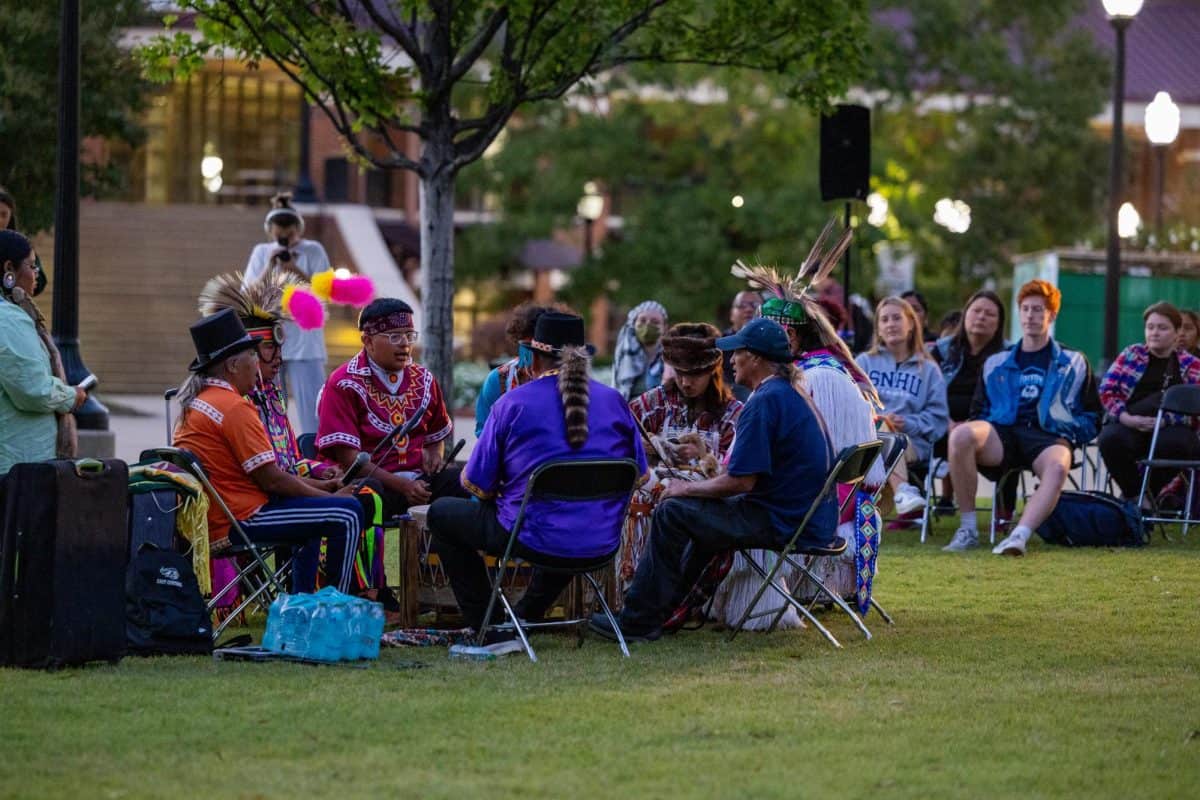The Bama Indigenous Student Organization Network hosted the Indigenous Peoples’ Day Cultural Exhibition to educate students about Indigenous culture and showcase Native American dancing on the Student Center lawn on Monday.
The event featured dancers from the Mississippi Band of Choctaw Indians and drumming from the Southern Pine Drum Group.
“To us, music is medicine — medicine meaning it helps our soul, it helps our spirit, physically it helps our body,” said Daniel Isaac, a speaker for the event and member of the Mississippi Band of Choctaw Indians. “But most of all … it’s good for the mind.”
Isaac is a member of the Choctaw Housing Authority and works for the United States Department of Housing and Development to ensure the Choctaws’ housing is safe and sanitary. He also described himself as a “tribal historian” and “spiritual guide.”
“The greatest misconception [of Native Americans] is that we’re no longer here, that we’ve been erased culturally,” Issac said.
Isaac said he saw miseducation during his time in the Air Force among his fellow servicemen when he told them he was Native.
“They would say, ‘No way, man, I thought you guys were long dead. The history book says there’s no more of your people,’” Isaac said. “Well, I got 10,000 back home, and the whole country will probably have over two million. That was in the ‘80s.”
“Go to the source if you really want to learn,” Isaac said. “I didn’t write the book, but I am the book.”
Currently, the U.S. Census Bureau estimates the Native American population to be 6.79 million, and over 72,000 live in Alabama.
Tables at the event educated attendees about basket weaving, artifacts from the Moundville Archaeological Park, and the Bama Indigenous Student Organization Network.
“We also want people to see that Native Americans and their culture are still alive and vibrant today. We are not just a group of people about which you learn on a page or two in a history book,” Kaytie Colbert, senior nursing major and president of BISON, said in an email. Colbert said she is a citizen of the Echota Cherokee Tribe of Alabama and is Poarch Creek.
“Many people are unaware that Alabama has 9 tribes,” Colbert said.
The most prominent of those tribes, and currently the only one federally recognized, are the Poarch Creek. The Poarch Creek currently have a reservation 8 miles northwest of Atmore.
The eight other tribes include the the Echota Cherokee Tribe of Alabama, the Cherokee Tribe of Northeast Alabama, the Ma-Chis Lower Creek Indian Tribe of Alabama, the Star Clan of Muscogee Creeks, the Cher-O-Creek Intra Tribal Indians, the MOWA Band of Choctaw Indians, the Piqua Shawnee Tribe and the United Cherokee Ani-Yun-Wiya Nation.
Aiden Sanders, a junior majoring in political science and history and the treasurer of BISON, said the group is open to all students, not just Indigenous students, though Sanders said he is a citizen of the Catawba Nation.
BISON’s table had several different signs with information about the nine tribes in Alabama, their locations and QR codes to donate to them.
Indigenous People’s Day was recognized by President Joe Biden in 2021, to honor American Indians, Alaskan Natives, and Native Hawaiians, but it is currently not recognized as a federal holiday, unlike Columbus Day, with which it shares the second Monday of October. It is celebrated in Alabama as American Indian Heritage Day, and Alabama is one of 17 states that has a holiday honoring Native Americans.
Isaac said the recognition was a “long time coming.” He also said he believed Americans should no longer celebrate Columbus Day.
“What did he discover?” Isaac said of the historical figure. “It’s like me traveling to France today. I go up there, hey, there’s the country there. I’m gonna discover it. French people [are] walking around, speaking French, and I say, ‘This is my country. Now, you guys, I’m gonna change it to Dan-America.’ How ridiculous would that sound today?”
Editor’s note: This story was updated Oct. 18 to correctly state Colbert’s tribal affiliation. Colbert identifies as Poarch Creek, but she is not a citizen of the Poarch Creek Indians tribe.









